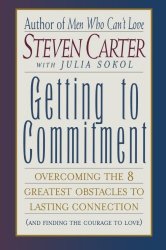Commitment Issues and Relationship Anxiety
By Dr. John D. Moore
Do you have a history of cycling in and out of relationships over a short period of time? Do you attach to love interests quickly but soon after, lose interest? Does it seem like you subconsciously do things to sabotage what you thought was a “good thing?” When things turn a little dull, do you look for an exit? If you answered yes to these questions, you may have commitment issues.
The topic of commitment issues in the context of romantic relationships pops up frequently with many clients who visit the Couples Counseling Center here in Chicago. We see this challenge in both men and women – old and young – straight and gay.
To keep it real, this is a problem that is often not discussed because it’s so widely misunderstood. Some people refer to this condition as “commitment phobia” or “relationship anxiety”. I will use these terms interchangeably as we continue along the way.
Commitment Issues in relationships
You won’t find the phrase “commitment phobia” in any clinical manuals. Rest assured, however, it’s a very real issue and is usually cloaked in serious anxiety and fear.
At its core, people who have commitment issues have difficulties staying in long-term relationships with others. It’s not that they don’t want to be romantically attached because in fact, most do. It is understandable to believe otherwise however given the confusion around this topic.
If you have commitment issues, you may confuse some of the normal excitement you feel about being with someone with other feelings, like anxiety.
If you are easily hurt (or fear being hurt) you may even have a “commitment phobia”. While the term phobia may sound a bit severe, at it’s essentially what we’re talking about – a fear of something bad happening.

What causes commitment Issues?
The reasons behind what causes a person to have commitment issues are far too many to list in this one post. What I can do is give you a rundown of the “biggies” so that you have a basis to assess your own personal situation.
Common causes include:
- Unmet needs during childhood
- History of abandonment
- Alcoholic parent(s)
- Complicated attachment issues
- History of being cheated on
- Struggles with self-esteem
Commitment Issues and intimacy
Some people who have relationship anxiety are accused of having abandonment issues. Others like to use the phrase “intimacy issues” (see our post). While these two constructs certainly can be part of the relationship fear dynamic, it’s a bit more complicated than that.
Most people who we work with that have challenges around commitment desperately want to be in a relationship but because of extreme fears of being hurt, struggle with making lasting attachments. Makes sense when you think about it.

What follows are 7 common signs in people who have commitment issues. If you can identify with four or more, there’s a fairly good change you carry with you a certain degree of relationship anxiety.
Below these symptoms, I have tried to identify intensity levels, based on the number of items listed that you can personally identify with.
Are you ready? Let’s take a look:
1. You constantly compare
If you are constantly playing the game of comparisons in your relationships and experience feelings of being “less than” a mate, consider this a problem. This may cause you to feel unworthy of being with someone – even though things seem to be going well.
2. Constantly testing your partner
People with commitment issues often test their partner to assess limits. Whenever a love interest does not “pass” the test, you find an excuse to flee or break things off. In many cases, these tests are nearly impossible to pass – regardless of how much the other person cares for you.
3. Extreme jealousies
Do you get super jealous when the person you are seeing gets attention? Do you become agitated and angry when others compliment your mate? Does the resulting pain make you want to call the entire relationship off? If you answered yes to this question, put a checkmark in the commitment issues column.
4. Pull/Push behaviors
Do you do things to pull a love interest closer to you and then, inexplicably, find ways to push them away? Is this behavior cyclical in nature and confuse the heck out of your partners? Does it seem like you do this at times without realizing you are doing so? If the answer is yes – check mark this one too.
5. Distant and aloof
Have you ever been told by a partner that you seem distant and aloof? Does this person describe you as being “disconnected” from what is going on in the relationship – including in the bedroom? Have you tried to address this issue by being more present, only to find you return to the same familiar pattern? If you are nodding your head in the affirmative, place a check mark in the column again.
6. Fear of rejection
Do you have deep feelings for someone but have difficulty expressing them? Are you afraid that if you let out your true feelings, the person will reject you? Does the thought of experiencing the emotional pain of unrequited love make you freeze up – unable to adequately express your inner truth? If you can relate, check off this one too.
7. Needy and clingy behaviors
Do you find yourself sometimes being too needy? Has someone you dated in the past described you as being “clingy”? Have you found that no matter how close you try to get to a love interest, it is impossible for them to meet your emotional needs? Do you break off the romance as a result?

Relationship Issues Scale By Responses
| Minor Commitment Issues | Moderate Commitment Issues | Severe Commitment Issues |
| 3 out of 7 | 4 out of 7 | 7 out of 7 |
| You exhibit a few signs of commitment issues | You exhibit moderate signs of commitment issues | You exhibit strong commitment issues |
| Issues may intensify over time. A concern but not catastrophic. | Your issues likely have caused you serious relationship problems | You are likely single with a history of cycling through relationships |

Healing from Commitment Issues
If the signs previously listed seem familiar to you, it is important that you are aware that you are not alone. The truth is many people hold deep fears of being hurt – particularly by someone they love and care about.
These fears become amplified if we have experienced a wound in the past, such as a cheating husband, girlfriend and so forth. Childhood trauma also can play into these fears.
The good news is that change is possible. If you are reading this, you are probably wondering exactly how? I won’t lie to you – it won’t be easy. Nothing in life really is though, is it? One thing I recommend is working with a therapist trained in relationships.
Here, we are talking about finding someone who has good insight and experience with understanding how people attach to one another in romantic relationships. Ideally, this person will have a good eye for spotting patterns, which you can collaboratively use to create change.
As an aside, it might be helpful for you to review our post on love styles as a way of generating greater self-awareness around your own approach to relationships. FYI: It is important that you think about your entire relationship history when you consider your attachment style and not make quick assumptions.
Commitment Issues Resource
Finding the pathway to healing from your commitment issues requires educating yourself more about your relationships fears – including where they come from and what they are all about. This is a necessary part of creating positive change. You want to feel emotionally empowered, right?

This is a great book for the person who has commitment issues or the individual attached to someone who is trying to work through this dilemma.
Final Thoughts
I want to encourage you to avoid the temptation of being a victim of your past. That will only be your truth if you let it. You have the power to create change in your life and you do not need to be forever constrained by events from yester-year.
The important message I want to communicate to you here is simply this – you are worthy of love and happiness. Healing, through self-insight and commitment to change, can happen for you.
Once accomplished, you can move towards being in a supportive relationship with another. Isn’t that what you ultimately want?
I’m including a fear of commitment poll below to help universalize response results from the list of 7 mentioned earlier. Bear in mind this is not a scientific instrument and the commitment issues scale should not be used for diagnostic purposes. Be sure to come back and compare your results with other website visitors.
Thank you for visiting Couples Counseling Center. Please Like us on Facebook, and share on Twitter!


